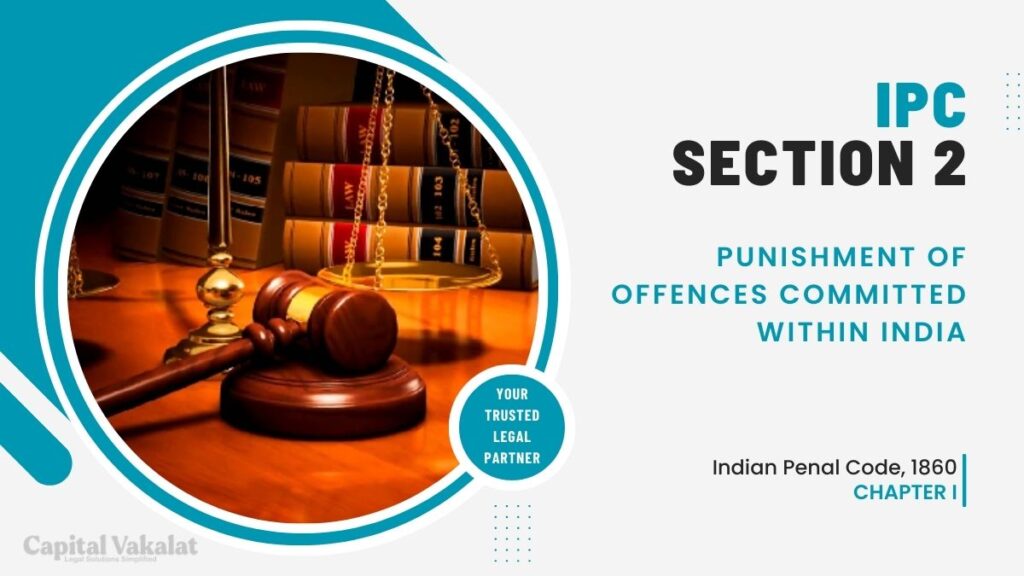In the Indian Penal Code (IPC), Section 2 holds paramount importance as it outlines the jurisdiction and applicability of the code within the boundaries of India. This section establishes the foundation upon which the entire criminal justice system operates, defining the extent to which the IPC’s provisions apply.

Let’s delve into the intricacies of Section 2 IPC, exploring its provisions and implications step by step.
Understanding Section 2 IPC
The opening provision of the IPC, Section 2, deals with the geographical scope of the code. It establishes that the code is applicable to all offences committed within the territory of India. This means that any act that constitutes a crime under the IPC and is committed within the geographical limits of the country falls under the jurisdiction of this code.
Territorial Jurisdiction
Application Across the Nation
Section 2 IPC ensures a uniform legal framework across the entire nation. Regardless of the state or union territory in which an offence is committed, the provisions of the IPC will be equally applicable. This helps in maintaining consistency in the interpretation and enforcement of criminal laws throughout India.
Exceptions and Special Laws
While the IPC serves as the primary legislation for dealing with criminal offences, there are instances where specific laws or regulations might apply in certain territories or circumstances. In such cases, these special laws will prevail over the provisions of the IPC. However, Section 2 remains the foundation upon which these laws are built.
Impact and Significance
Ensuring Justice
Section 2 of the IPC ensures that individuals cannot escape legal consequences simply by crossing state borders. This provision plays a crucial role in maintaining law and order by preventing offenders from evading prosecution through geographical maneuvering.
Clarity in Application
The inclusion of Section 2 provides clarity on which legal framework applies to offences committed within India. This clarity not only aids law enforcement agencies but also guarantees that individuals are aware of the consequences of their actions, irrespective of their location within the country.
Conclusion
In conclusion, Section 2 IPC plays a pivotal role in defining the scope and extent of the Indian Penal Code. It establishes that the code applies to offences committed within the geographical boundaries of India, ensuring a consistent and comprehensive legal framework. This provision underlines the commitment of the Indian legal system to uphold justice and maintain order across the nation.
Certainly! Here are some external resources that provide further details on the topic of Section 2 IPC and its implications within the Indian legal framework:
- Indian Penal Code, 1860 (Full Text) – Access the complete text of the Indian Penal Code, including Section 2 and its provisions.
- Legal Services India – Understanding IPC Section 2 – Gain insights into the significance of Section 2 of the IPC with an informative article.
- Law Times Journal – Scope and Applicability of Section 2 IPC – Delve into the details of Section 2 and its application within the Indian legal system.
These resources offer comprehensive insights into Section 2 IPC and its role in shaping India’s criminal justice framework.
FAQs
Can special laws override Section 2 IPC?
Yes, in specific cases or territories, special laws may take precedence over the provisions of Section 2 IPC. However, the foundation of jurisdiction remains rooted in Section 2.
Does Section 2 IPC apply to all states equally?
Yes, Section 2 IPC ensures that the code’s provisions are uniformly applicable across all states and union territories of India, maintaining consistency in the legal system.
How does Section 2 IPC contribute to justice?
Section 2 IPC prevents offenders from escaping legal consequences by crossing state borders, thus contributing to a just legal system where geographical location does not impact accountability.
Where can I access the full IPC?
You can buy the complete Indian Penal Code book to gain a comprehensive understanding of the legal provisions governing India’s criminal justice system.